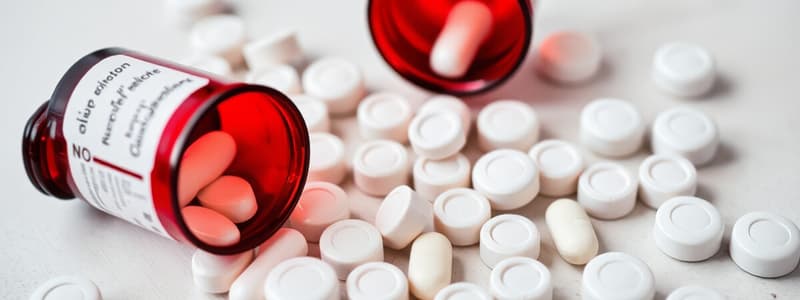Podcast
Questions and Answers
Neuroleptic malignant syndrome (NMS) is characterized by muscular rigidity and hyperthermia.
Neuroleptic malignant syndrome (NMS) is characterized by muscular rigidity and hyperthermia.
True (A)
The incidence of NMS was recorded as high as 1.6% in a drug safety program from 1993-2015.
The incidence of NMS was recorded as high as 1.6% in a drug safety program from 1993-2015.
False (B)
NMS is more likely to occur in females than in males.
NMS is more likely to occur in females than in males.
False (B)
High-potency First Generation Antipsychotics (FGAs) have the highest incidence of NMS.
High-potency First Generation Antipsychotics (FGAs) have the highest incidence of NMS.
Benzodiazepines are recommended as a treatment for NMS.
Benzodiazepines are recommended as a treatment for NMS.
NMS can occur without the administration of antipsychotic medications.
NMS can occur without the administration of antipsychotic medications.
There is a known association between NMS and the use of SSRIs.
There is a known association between NMS and the use of SSRIs.
The clinical presentation of NMS is uniform across all cases with no variability.
The clinical presentation of NMS is uniform across all cases with no variability.
Fluctuating blood pressure and tachycardia are included as signs and symptoms of Neuroleptic Malignant Syndrome.
Fluctuating blood pressure and tachycardia are included as signs and symptoms of Neuroleptic Malignant Syndrome.
High-potency FGAs and abrupt withdrawal of anticholinergic agents can trigger Neuroleptic Malignant Syndrome.
High-potency FGAs and abrupt withdrawal of anticholinergic agents can trigger Neuroleptic Malignant Syndrome.
Rehydration is not a recommended treatment for Neuroleptic Malignant Syndrome in the medical/A&E unit.
Rehydration is not a recommended treatment for Neuroleptic Malignant Syndrome in the medical/A&E unit.
It is safe to restart antipsychotic medication immediately after symptoms of Neuroleptic Malignant Syndrome have resolved.
It is safe to restart antipsychotic medication immediately after symptoms of Neuroleptic Malignant Syndrome have resolved.
Using drugs with low dopamine affinity is recommended when restarting antipsychotics after Neuroleptic Malignant Syndrome.
Using drugs with low dopamine affinity is recommended when restarting antipsychotics after Neuroleptic Malignant Syndrome.
Electroconvulsive therapy (ECT) may be effective for Neuroleptic Malignant Syndrome even after other treatments have failed.
Electroconvulsive therapy (ECT) may be effective for Neuroleptic Malignant Syndrome even after other treatments have failed.
Male gender and younger age are identified as protective factors against Neuroleptic Malignant Syndrome.
Male gender and younger age are identified as protective factors against Neuroleptic Malignant Syndrome.
Bromocriptine and dantrolene are among the treatments considered for managing Neuroleptic Malignant Syndrome.
Bromocriptine and dantrolene are among the treatments considered for managing Neuroleptic Malignant Syndrome.
Flashcards are hidden until you start studying
Study Notes
Neuroleptic Malignant Syndrome (NMS)
- Definition: NMS is a rare but serious condition that can occur after exposure to antipsychotic medications.
- Symptoms:
- Fever
- Muscle rigidity
- Altered consciousness
- Autonomic dysfunction
- Key characteristics:
- Significant variation in clinical presentation from mild to severe
- Often seen as acute, but can manifest with few obvious symptoms
- Elevated creatine kinase (CK) levels can occur without outward symptoms
- Risk factors:
- Male gender
- Younger age
- Dehydration
- Exhaustion
- Confusion or agitation
- History of:
- Psychosis
- Organic brain disease
- Alcoholism
- Parkinson's disease
- Hyperthyroidism
- Psychomotor agitation
- Mental retardation
- Incidence and Mortality:
- Incidence difficult to determine due to changing medication regimens and recognition
- Overall incidence rates range from 0.11% to 0.16%
- Higher incidence associated with older, high-potency first-generation antipsychotics (FGAs)
- Lower incidence with second-generation antipsychotics (SGAs)
- Mortality rates may be lower with SGAs than FGAs
- Treatment:
- Initial Management:
- Stop antipsychotic medication
- Monitor temperature, pulse, and blood pressure
- Consider benzodiazepines if not already prescribed
- Medical/Emergency Department:
- Rehydration
- Bromocriptine + dantrolene medications
- Sedation with benzodiazepines
- Artificial ventilation if necessary
- L-dopa, apomorphine, and carbamazepine have also been used in some cases, but these treatments may not be considered standard practice.
- Restarting Antipsychotics:
- Consider antipsychotics structurally unrelated to the one initially associated with NMS
- Use low dopamine affinity options like clozapine or quetiapine or aripiprazole
- Commence with very small doses and increase extremely slowly with close monitoring
- Monitoring of physical and biochemical parameters should be done
- Avoid depot or long-acting injectable (LAI) antipsychotics and high potency FGAs
- ECT:
- May be considered when other medications are ineffective
- Initial Management:
- Co-Prescription Risks:
- NMS can occur with co-prescription of:
- Antidepressants
- Valproate
- Phenytoin
- Lithium
- SSRIs
- Cholinesterase inhibitors
- NMS-like syndromes may be associated with drug combinations related to antidepressant use
- NMS can occur with co-prescription of:
Key Points for NMS:
- NMS is a rare but serious adverse effect of antipsychotic medications.
- Antipsychotic medication will usually be required again after the acute episode resolves.
- Early recognition and treatment are essential to prevent life-threatening complications.
- NMS can be difficult to diagnose, and its incidence and mortality rates vary due to a number of factors.
- Benzodiazepines are a recommended treatment for NMS, but they are not always effective.
- There is no single, definitive treatment for NMS, and several different approaches may be used.
- It's crucial to be aware of risk factors and signs and symptoms of NMS.
- Medical and psychiatric professionals play a vital role in recognizing, diagnosing, and treating NMS.
Studying That Suits You
Use AI to generate personalized quizzes and flashcards to suit your learning preferences.



